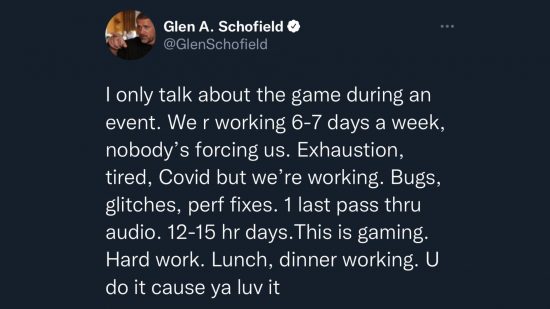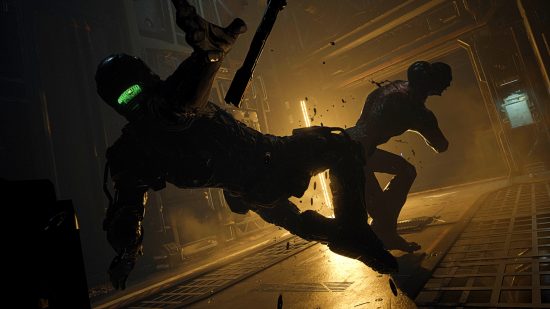The Callisto Protocol: Schofield apologizes for crunch culture allegations

The Callisto Protocol
The recent statements by Glen Schofield, CEO of Striking Distance Studios and author of The Callisto Protocol, have raised a real fuss. The author, in fact, only a few hours ago shared a tweet that sparked a lot of controversy and earned him accusations of crunch culture. The post in question was promptly removed by Schofield himself but not fast enough to avoid controversy. Precisely for this reason, he has decided to publicly apologize with a new tweet on his profile.
Obviously, the tough answers were not long in coming. In particular, Bloomberg's Jason Schrierer harshly attacked the CEO of Striking Distance accusing him of crunch culture. The journalist, in his outburst, added that while not forced, all those who do not adapt to this practice are heavily penalized in their work environment and that the head of a studio should not promote such attitudes. In a rather harsh second part, Schrierer also added that it doesn't surprise him that the one who leads the team and who manages the salaries celebrates this type of practice.
Anyone who knows me knows how passionate I am about the people I work with. Earlier I tweeted how proud I was of the effort and hours the team was putting in. That was wrong. We value passion and creativity, not long hours. I'm sorry to the team for coming across like this.
- Glen A. Schofield (@GlenSchofield) September 3, 2022
Callisto Protocol director’s tweet sparks crunch discussion
A now-deleted tweet from The Callisto Protocol director Glen Schofield, the co-creator of Dead Space and former co-director on several Call of Duty games, has fired up discussions about crunch in videogame development over America’s Labor Day weekend. Crunch culture has long been a serious point of discussion, especially in the game industry. The concept of ‘crunch’ – working long overtime hours to push for more development progress – has been widely criticised by many prominent members of the industry for causing negative symptoms including burnout and depression among developers forced (explicitly or implicitly) into pushing past healthy work boundaries.
The tweet, from Striking Distance Studios CEO Glen Schofield, read as follows (edited for clarity): “I only talk about the game [The Callisto Protocol] during an event. We are working 6-7 days a week, nobody’s forcing us. Exhaustion, tired, Covid, but we’re working. Bugs, glitches, performance fixes. One last pass through audio. 12-15 hour days. This is gaming. Hard work. Lunch, dinner working. You do it ‘cause ya love it.”
The tweet was later deleted by Schofield, but was archived by several people including Bloomberg reporter Jason Schreier, who posted a screenshot of the tweet. Schreier hits out at the sentiment, calling it “weaponised passion” and saying, “This, from a studio head, is crunch culture defined. Of course nobody is ‘forced’ to work insane hours. But imagine the reduced bonuses and lack of promotion opportunities if you don’t?” Schreier goes on to say that “This is why people burn out of gaming [development].”
Schofield then posted a tweet apologising for his earlier statement. In his follow-up, he says, “I tweeted how proud I was of the effort and hours the team was putting in. That was wrong. We value passion and creativity, not long hours. I’m sorry to the team for coming across like this.” His statement re-ignited discussions around the topic, however – not least because they happened during America’s Labor Day weekend, a holiday to honour and recognise the American labour movement.

Jessica Gonzalez, founder of employee organisations A Better ABK and the Game Workers Alliance, says in a tweet, “I feel so bad for Glen’s developers. Imagine your studio head posting this. Toxic.” Her and Jason’s tweets were just the start, as many other development figures chimed in to offer their support and thoughts on the topic. Don’t Nod creative director Florent Guillaume says Schofield’s tweet reminds him of his days with Ubisoft – “Of course we are passionate about our work, but that’s how people have been constrained to crunch for decades, and still are.”
A lot of developers echo Guillaume’s sentiment, condemning the idea of excusing overwork with ‘passion.’ Naughty Dog senior tech gameplay animator Maebe Jay Sewell reflects Schreier’s terminology, saying that she calls this effect “passion crunch” and that “It causes bad productivity expectations, worker exploitation, burnout, and teaches new devs the same causing a circular pattern of passion crunch.” Coraly Rosario, senior UX designer at Niantic, says, “Crunch is not ‘the standard’ nor acceptable. Proving your passion doesn’t mean you sacrifice everything else for it. Personally, I view it as a leadership and production failure, regardless of whether your employees opt into it.”
Many comments say that the perceived need for overtime crunch is a consequence of mismanagement. Bungie senior design lead Tom Farnsworth remarks that “Crunch is unnecessary, and represents a failure of planning by leadership.” Minecraft tech lead Mikael Hedberg comments, “Individual devs crunch because they’re too passionate to let awful planning ruin projects. This makes poorly planned projects work out, and the people in charge who created the awful plans get bonuses. The cycle continues.” Mike Bithell of Bithell Games adds, “Crunch is bad and is always a failure of management to accurately scope/budget projects.”
The NPD Group’s Mat Piscatella further emphasises that “Crunch isn’t something to be proud of. If not planned, it represents a failure somewhere in the pipeline. If planned, it represents cruelty. In any case, it ain’t good.” Dragon Age: Dreadwolf creative director John Epler of Bioware explains how the actions of a studio head can affect their team: “One of the hardest lessons to learn is that when I crunch, other people crunch. Either because I’m creating additional work (assets don’t stop with me), or because people see it and think ‘oh I guess that’s the expectation.’”
Many devs have taken the opportunity to call on their peers, especially those in positions of power, to take the lead in doing better. Blizzard audio producer Kayla Arenas, formerly of Riot, tells producers to “Build in buffers to avoid crunch and stay ahead of/on schedule. Localisation tells you they need four weeks? Give them six when you chart your timeline.” TT Games lead designer Tim Spencer addresses Schofield directly, saying, “You should be forcing your staff to work eight hour days, five days a week, take their holidays whenever they like, and change scope/launch date to suit.” Obsidian game director Carrie Patel gives advice to those in leadership positions: “Don’t normalise crunch. Don’t build an unrealistic schedule on your team’s ‘passion.’ Don’t weaponise their care. Healthy, high-functioning teams make great games, and they stick around to make them for the long-term.”

Carrie’s sentiment about happy, healthy devs producing better output is echoed by many other members of the game industry. Rami Ismail (formerly of Vlambeer) maintains that “No game in the history and future of game dev was or will ever be worth the health of even a single developer.” Blizzard principal game designer Mike Stout says, “I’ve crunched a lot in the last 20 years of making games. It’s never been worth it. Not one time. It damages people, it damages the game, and it’s never as effective as proper planning, scoping, and project management. It’s bad leadership.”
Andrew Spinks, lead developer on Terraria, says that “Re-Logic employees only work four days a week, get plenty of holidays, and frequent bonuses. You should have a life outside of your job, no matter how passionate you are.” Ash Lyons, lead VFX artist at Gearbox, comments that “problems don’t get solved when you’re overworked. In fact, many of my ‘AH HA’ moments have arrived while not at work, but while staring at a wall or cleaning my kitchen.”
The message, it seems, is as clear across the board as it was last time similar discussions were raised – crunch is detrimental to the health of a company’s workers and, ultimately, detrimental to the health of a project. It’s something that requires careful management to avoid, and those in positions of power need to be aware how their own personal desires to put in extra hours can reflect on the teams that they hold power over.
Hopefully, each time these conversations arise, they help spread the word a little further – both among those in game development and among people who play and enjoy videogames, so that they can better understand the human cost that goes into making the things we all love so much.
Our recent trip to Gamescom saw us talk to Trivium’s Matt Heafy on metal in games, explore the FromSoftware homages in Lies of P, and contemplate how the upcoming Hyenas needs more Escape From Tarkov. We’ve also got recent Victoria 3 impressions for the upcoming strategy game, and a Tempest Rising interview talking about the game’s similarities to EA’s Command & Conquer and how its devs hope it will inspire a new entry in its own series.